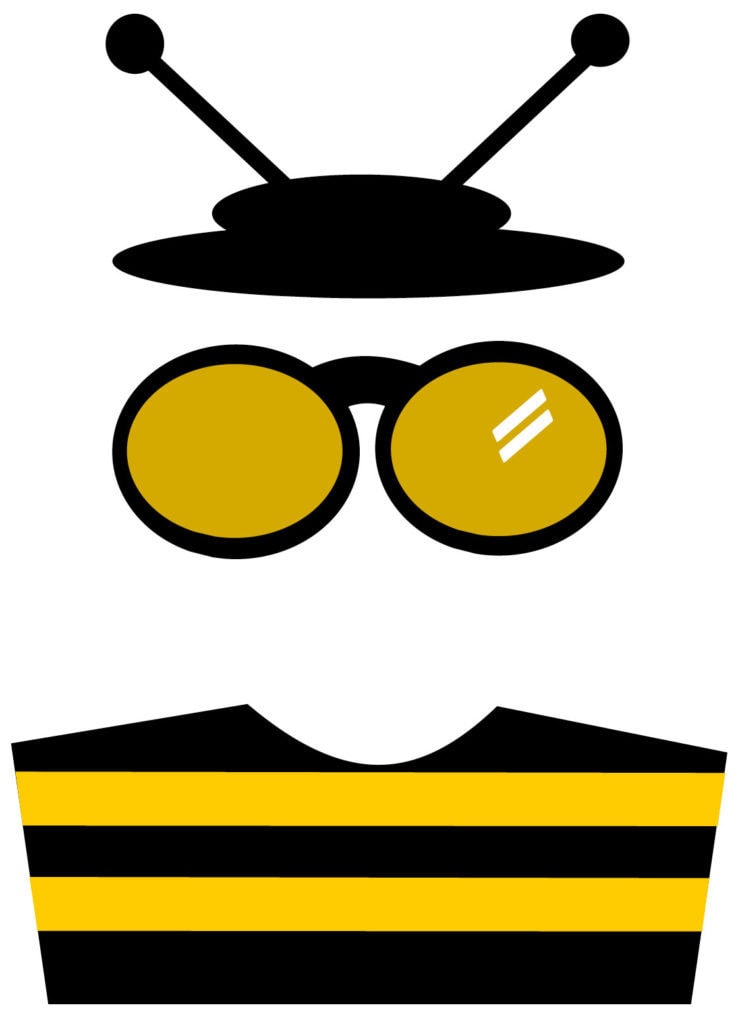On the first day of my freshman year of high school, my English teacher dressed up like a bumblebee and danced around the room to the Blind Melon song “No Rain.”
For those of you who weren’t teenagers in the mid-1990s, stick with me and trust that this is a meaningful song for a small generation. The music video opens with an awkward little girl in a bee costume tap-dancing on stage. After the audience laughs her off, she prances and dances around town anyway, a defiant hero for happiness in a melancholy world. She eventually comes upon a pasture filled with other people in bee costumes, and then the little girl opens the gate and dances into bumblebee heaven.
Ms. Gallagher must’ve been bummed that we weren’t also dressed up like bees, but she, too, danced anyway. She was in her 30s at the time, with big glasses and a head of close-cut, curly dark hair. We were 13 or 14, all bowl cuts and bangs and baggy clothes. As the stereo speakers let out that twisted whine—“All I can say is that my life is pretty plain”—she pirouetted through the rows of desks, arms out and wrists flapping up and down, telling us that the girl in the video reminded her of herself. In hindsight, it all seems a little batty, but for those four minutes, Ms. Gallagher was the coolest teacher on the planet.
 Twenty-five years later, I’m in my 30s, same as she was then, only I’m on the phone with a guy about a 401(k) rollover. Just then an email arrives from my editors, asking me to write about the future. They’re an opportunistic bunch. I got married last fall, and it’s natural to look ahead to houses and kids and all those other things people shove into life’s duffel bag before taking off for good.
Twenty-five years later, I’m in my 30s, same as she was then, only I’m on the phone with a guy about a 401(k) rollover. Just then an email arrives from my editors, asking me to write about the future. They’re an opportunistic bunch. I got married last fall, and it’s natural to look ahead to houses and kids and all those other things people shove into life’s duffel bag before taking off for good.
Related: 5 Tips to Create Your Best Future
I’ve attempted to forecast my future before, but I was way off. This was also in high school, two years after Ms. Gallagher’s class, at the end of my junior year. That’s when a very serious English teacher named Mr. Moore gave us an extra-credit assignment called the “five-year letter.” The deal was that we all wrote letters to ourselves and put them in envelopes, stamped and addressed to a place where someone would know where to find us in five years. Mr. Moore didn’t read the letters, but gave us extra-credit points that boosted our final grades simply for attempting the assignment.
The points, in my case, were a welcome treat. Mr. Moore was no dancing bumblebee. He’d spent seven years in the U.S. Marine Corps before becoming a teacher. I rarely made better than a C in his classes. He wore a button-down shirt and tie and had a beard I could only dream of growing. The only time I saw him dressed down was when he took our class on an overnight writing retreat to an environmental center along the Potomac River, not far from our school in rural southern Maryland. We were to write three journal entries about things we saw—something small, something large and something personal—then use those notes to write a narrative. We went on a canoe trip and met a rescued bald eagle and told ghost stories around a campfire at night. When I woke up early the next day, I spotted Mr. Moore lying on his back on a picnic table, arms behind his head, relaxed and smiling at the sunrise.
He was also the school newspaper adviser, which made him an important gatekeeper for me. From the age of 8, I was set on becoming a newspaper journalist. I desperately wanted this man to like my writing, but he didn’t. In a parent-teacher meeting, Mr. Moore suggested to my mother that I should pursue a career other than writing. I was an A math student, after all. For a night, it crushed me. Then it made me mad. Eventually I agreed with him: Engineering school wouldn’t be so bad. But in the final coping step, I turned it into motivation to prove him wrong.
Each June, Mr. Moore mailed a batch of letters to the students who graduated five years earlier. I remember when mine came to my parents’ house in 2002, but I don’t remember what it said or where it is now. What I do remember is that I was making just above minimum wage as a sports writer at a small-town newspaper in the Virginia mountains. Take that, Mr. Moore.
Mr. Moore was no dancing bumblebee. He’d spent seven years in the U.S. Marine Corps before becoming a teacher. I rarely made better than a C in his classes.
 For 12 years I moved around the Mid-Atlantic, chasing bigger newspaper and magazine jobs. In 2013 I wrote a story for a national sports website that made its way to Mr. Moore’s computer screen. You can imagine my surprise when an email popped up with his name on it. He told me that he thought the story was “pitch perfect.” I was 33 years old, and I could’ve quit this whole game right then.
For 12 years I moved around the Mid-Atlantic, chasing bigger newspaper and magazine jobs. In 2013 I wrote a story for a national sports website that made its way to Mr. Moore’s computer screen. You can imagine my surprise when an email popped up with his name on it. He told me that he thought the story was “pitch perfect.” I was 33 years old, and I could’ve quit this whole game right then.
I’ve told that story many times, to friends and bosses and in a few speeches, always portraying myself as the triumphant worker who proves the teacher who doubted him wrong. I never had the nerve to tell Mr. Moore, though, until now. Late last year, I sent a note to my past to see if he’d be willing to discuss those letters about the future. He said he would. A few days after Christmas, we talked for the first time in two decades, and I’m here to tell you that you never know how things will turn out.
* * *
Long before we were married, Laura and I talked about whether we’d have children. She always knew she wanted them; I’d never been persuaded either way. My indecisiveness played a big part in every failed relationship I’d had before this. From the first date with Laura, though, anything seemed possible.
We had the conversation around the time of the troubling summer of 2016, as election stories grew more vicious and tiresome, a mass shooting occurred in Orlando, and several police officers were killed one July night in Dallas.
“I’m just not sure we should be bringing people into a world like this,” I remember telling Laura.
She didn’t hesitate: “I think we’re exactly the kind of people who should be bringing people into a world like this.”
It was an obvious appeal to my ego—Hey, Mike, you’re a half-decent person, and because of that, you’ll raise half-decent people, too. We’ve already established that I’m someone who’ll wait 20 years for praise from a teacher, so you probably won’t be surprised when I tell you that Laura’s flattery worked.
It’s also telling that my concern was what “a world like this” can do to children, while Laura’s mind was on what cures they can offer that world. Either way, I haven’t had any doubts about having children with her since that talk. We bought a house a few months ago, and we’ve even picked a time in the next few years when we’d like to bring this good and Earth-improving being here, but I’m not telling you when that is because even an essay writer should keep some things to himself.
Lately I’ve caught myself at birthday parties for friends’ kids, watching them as they toddle through life. There are whole civilizations of them out there—independent ones and joiners, wild ones and deceptive ones, talkers and listeners—all trying to figure out how to exist alongside each other, a decidedly easier mission without the strains of finances. When I watch them interact, I don’t worry about money or losing our ability to travel whenever we want. I see promise, and I wonder: Where will my kid fit in?
* * *
The great writer John Jeremiah Sullivan once was asked to write about the future of the human race. He went out in search of an expert. “I’d unconsciously internalized a belief in the existence of some person,” he writes in an essay that’s included in his collection, Pulphead, which you absolutely should buy right now and without delay, “who sits in a room in the bowels of some governmental building and actually knows what’s going to happen in the future, whose mutterings need to be heeded, whose moods must be tracked with concern if not alarm, and whose very existence is a cause all over the world of slight, constant anxiety, and properly so.”
Wouldn’t it be wonderful to call someone and ask all the important questions about what kind of society awaits our children?
That person, of course, doesn’t exist, which is a real shame. Wouldn’t it be wonderful to call someone and ask all the important questions about what kind of society awaits our children: what the temperature will be, if they’ll have enough water and food, how technology will change, where the nukes will explode, if the Orioles will ever win a World Series again, how long we have until Elvis impersonators are extinct?
Ten years ago, in 2008, CBS News legend Mike Wallace published a book called The Way We Will Be 50 Years From Today. He brought together “60 of the world’s greatest minds” to predict the future.
Not surprisingly, the geniuses disagree on some points.
In one essay, Louis J. Ignarro, a 1998 Nobel Prize winner for medicine, says that “people will experience a dramatic shift to a healthy lifestyle in the next 50 years.” In the very next entry, Wanda Jones, the former director of the office on women’s health at the U.S. Department of Health and Human Services, says that people in 2058 will actually be less healthy, and that life expectancy will drop by three to five years.
Other predictions, taken alone, are entertaining—things like, say, California becoming its own nation, or the United States fully adopting the metric system.
But over and over, the authors agree that there will be one main question for people in 2058.
“Several decades hence, the burning political, economic, and social issues of the day will not be terrorism or war, or abortion and stem cell research,” writes Richard Clarke, the former national coordinator for security and counterterrorism for presidents George W. Bush and Bill Clinton. “The issue may be something far more profound: What does it mean to be human?”
The artificial intelligence conversation has advanced in 10 years, but if you’re reading this, there’s a good chance you’re still a human.

Arthur Caplan has an idea. Caplan was the chair of the department of medical ethics at Penn in 2008, and he’s now a professor of bioethics at New York University. In his entry for Wallace’s book, Caplan invents a character, a great-grandson named Simon, and takes us through his typical day in 2058. To start, Simon wakes up and takes in a breakfast of juice that’s been genetically engineered just for him, then heads off to his job as a climate engineer at a consortium that regulates the Earth’s temperatures. And by “heads off to his job,” obviously I mean he goes to a place in his house from which he telecommutes. Simon works only five hours a day and has a life expectancy of 140 or so, but he’s stressed on the morning we meet him. He considers taking a cognitive enhancement supplement that will minimize his worries, but he’s already taken one in the past 24 hours. If he adds another it’ll almost certainly show up in his digital records, which his doctor will see, and if that happens Simon knows he’ll be sent to a virtual class on supplement abuse.
The advancements in genetic medicine may dramatically improve health and lives, but Simon serves as a reminder that as everything becomes more individualized, people might become more plain and cold and similar.
Clarke, the former security coordinator, expanded on this idea in his entry. The controversy over baseball players and steroids in the early 2000s, Clarke wrote, was only the beginning of the debate about human enhancement. One day our biological brains will interact directly with silicon-based computer memory chips, Clarke wrote, and we’ll be able to add memory to our brains like we do with laptops. He added that some people in 2060 will be superhumans who are measurably more intelligent than others.
The artificial intelligence conversation has advanced in 10 years, but if you’re reading this, there’s a good chance you’re still a human. And if you’re still a human, there’s a good chance you’re a little uneasy about living in a society where your wealthier neighbor can purchase more brainpower than you can, especially if you share a tax bracket with, say, magazine writers.
Still, I think Laura and I will go ahead with the kid thing, for giggles.
* * *
For all the influence technology may have one day, its current state is such that I searched all over and could not find Ms. Gallagher, my ninth-grade English teacher. The actual Bee Girl from the Blind Melon music video has a Facebook page with about 6,000 followers. She’s in her 30s, and a recent magazine story says that she got married last fall. I wrote to her to see if she’d be interested in participating in this little experiment about the future, maybe see if she knew whether there would be room for Bee Girls among the robots in 50 years, but she didn’t respond.
Mr. Moore did.
I hadn’t heard his voice in 20 years, but I recognized it immediately. It didn’t make me nervous or send me back to his classroom or anything. It was comforting, a reminder of a time before mortgages.
 Mr. Moore retired in 2011. He sent his last batch of five-year letters in 2016. He mailed them every June. Some students mailed photographs to themselves. Others sent money. Some kids turned in big manila envelopes packed full. Others turned in a single sheet of paper. Mr. Moore didn’t grade the assignment for effort. The only judge would be some unknown adult five years down the road who, lord willing, would have a better haircut.
Mr. Moore retired in 2011. He sent his last batch of five-year letters in 2016. He mailed them every June. Some students mailed photographs to themselves. Others sent money. Some kids turned in big manila envelopes packed full. Others turned in a single sheet of paper. Mr. Moore didn’t grade the assignment for effort. The only judge would be some unknown adult five years down the road who, lord willing, would have a better haircut.
“It didn’t matter to me,” Mr. Moore told me. “What mattered was that they had the chance to interact with themselves. What they did with it was up to them.”
When Laura and I moved, I searched through every box and folder, hoping to find my five-year letter. I discovered a few presents from the past—my first byline in the high school newspaper, an envelope with $400 cash that my mother hid and lost years ago—but couldn’t find the letter. My younger brother was salutatorian of his class. I asked if he remembers his.
“It was something like, ‘I’m writing this to get extra credit,’ and that was it,” Kenny told me. “I remember getting it and wishing I’d tried harder.”
Mr. Moore still has a stack of envelopes that were returned to him for various reasons—address changes, not enough postage. He keeps them in a drawer downstairs in his house, in case someone comes looking for one.
He’s heard from several former students over the years. One young woman received her letter the night before her wedding. As a high schooler, she’d predicted that she’d marry a boy in her class. As an adult, she laughed at those words and married someone else the next day. One student died in a car accident a couple of years after graduation. His mother asked to have the letter from Mr. Moore before the five years were up. “She just couldn’t stand to get the letter by surprise,” Mr. Moore told me.
Probably the most memorable letter for Mr. Moore was the one his oldest daughter wrote.
Adi was two years ahead of me and the smartest kid in school. She was valedictorian of the class of 1995, a title for which she fought fiercely. I was in a newspaper class with her during her senior year, and I remember how she’d tell the story of the B she received in Spanish as a freshman. She disputed the grade with the teacher until the day she graduated.
Adi was like that from the start, Mr. Moore said. She was the first of four children. When she was in elementary school, her younger sister showed promise in sports. Mr. Moore remembers saying something to them he’d regret: “I told Adi that she was my little scholar and Jessica was my little athlete,” he told me. “And boy did that drive Adi.” Adi went on to star on the high school field hockey team and play at the University of Maryland.
Naturally, she took the letter assignment seriously.
Adi got married in June of 2000. When Mr. Moore mailed the class of 1995’s letters that month, he held hers and handed it to her the morning of her wedding. In it, she’d predicted that she would meet her soulmate within the five years.
Adi became an attorney and had three kids. She was successful at just about everything she tried. But as a young adult, she began to show signs of mental illness, Mr. Moore told me. She received treatment for it for years and climbed in her field in spite of it, but in 2012, one day after she turned 35, she died unexpectedly. For the purposes of this story, we’ll leave it at that.
“It was a tough time,” Mr. Moore said plainly, his voice cracking. “It’s still tough.”
Adi’s husband remarried and had another child, and Mr. Moore and his wife remain close with their grandkids. They’d just spent a few days with them for Christmas when we talked.
“Anyway, I know you didn’t call to talk about this,” Mr. Moore said, interrupting himself several times during the call. Then he’d tell another story about Adi, and I’d listen.
I went back to the boxes and pulled out the yearbook from 1995 after we talked. Adi’s classmates voted her “Most Likely to Make a Million.” A few years ago, those same classmates invited Mr. Moore and his wife to their 20-year reunion. They gave the family a red crepe myrtle as a tribute to Adi. It’s now planted in their yard, and growing.
We talked for almost 90 minutes that day—about our families and other changes we’ve been through, about the journalism industry and teaching, old friends of mine and former colleagues of his. We’ve corresponded a few times since. I hope it continues.
“Let me ask you,” he said at one point, “do you look back fondly on high school?”
The question struck me directly. For two decades I’d carried around this man’s words as motivation, but all I could say was yes. I do look back fondly, and I mean that. One day in the future, my kid would be lucky to have teachers like the ones we had—teachers who helped bumblebees find their identities, teachers who pushed underperforming students to think about where they were going, teachers who would pick up the phone many years later to help us understand that not having all the answers is part of what makes us human.
And yes, I brought up the comment he’d made to my mom, the one about how I should think about choosing a different career path. You know what? Mr. Moore doesn’t remember saying it. We laughed and moved on. It wasn’t important anymore.
This article originally appeared in the Fall 2018 issue of SUCCESS magazine.











